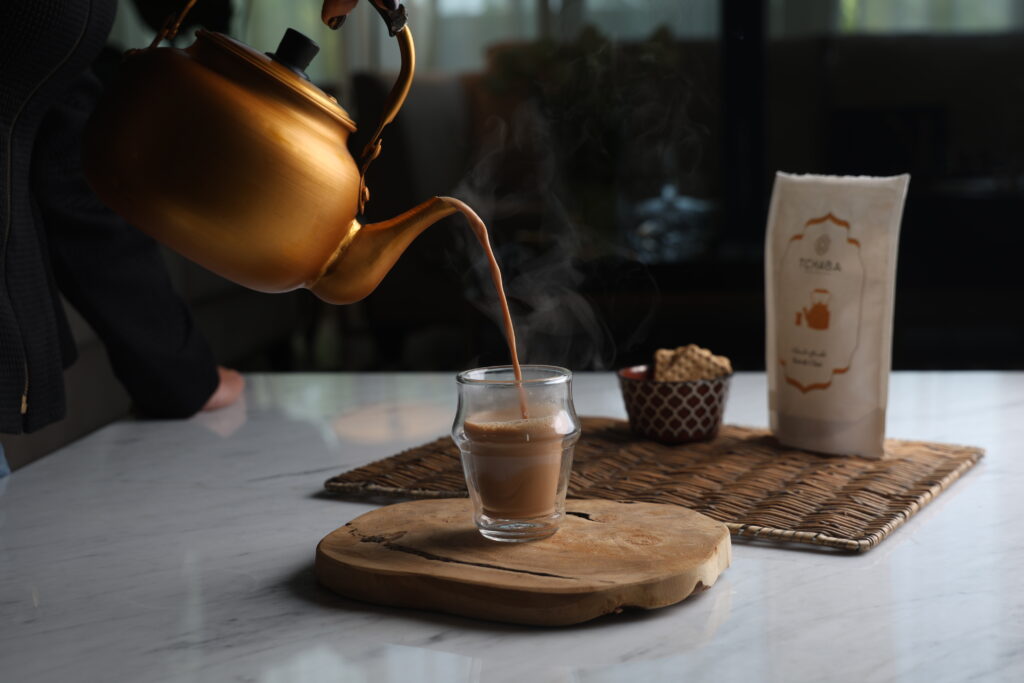Add 200.00 AED for free shipping.
Add 200.00 AED for free shipping.
Add 200.00 AED for free shipping.
Add 200.00 AED for free shipping.

Karak tea is a fixture in daily life across the UAE and the wider Gulf strong, creamy, and satisfying. At its core, Karak is simply black tea boiled with milk and sugar. No elaborate spice blends, no long ingredient list. This simplicity is part of its charm and what sets it apart from other milk teas around the world.
Many assume Karak and Indian masala chai are the same, but they have distinct identities. Masala chai is built around a rich spice blend cardamom, cinnamon, ginger, cloves, and more infused into black tea and milk.
Karak, on the other hand, began without those layers of spice. Its focus is strength: a bold, full-bodied tea flavor balanced by the creaminess of milk and the sweetness of sugar. Over time, specialty cafés and roadside tea stalls in the Gulf began experimenting, adding cardamom, saffron, or even rosewater but these are enhancements, not part of the original definition.
Karak’s story begins with the Indian subcontinent, where strong milk tea was a daily staple. Indian workers and traders brought this tradition with them to the Gulf during the 20th century, adapting it to local tastes. The result was Karak a tea that shared the strength and richness of its Indian cousin but without the masala spice blend. It quickly became part of the Gulf’s identity, found everywhere from street-side kiosks to high-end hotels.
In Dubai, Karak became more than a drink it became a meeting point. It’s common to see cars queuing outside small tea stalls late into the night, the air thick with steam from freshly brewed pots. From construction workers on break to families on evening drives, Karak draws all walks of life. In a city of constant change, this humble tea remains a constant.
The real “wellness” of Karak isn’t about antioxidants or health claims it’s about the moments it creates. A cup of Karak is an invitation to slow down, connect, and share time with others. It’s the comfort of familiar faces at the same roadside café, the laughter shared over small porcelain cups in a majlis, the quiet reflection during a solo evening drive.
Karak’s ritual waiting for it, sipping it slowly, and often enjoying it with snacks is a form of mindfulness rooted in everyday life across the Gulf.
While the classic recipe remains a staple black tea, milk, sugar modern tea shops have turned Karak into a canvas for creativity. Cardamom brings floral spice, saffron adds golden luxury, and rosewater lends a perfumed finish. These variations have their place, but purists still insist that true Karak is defined by strength and simplicity.
For home preparation, Tchaba’s Shai Karak blend captures that balance of bold tea and smooth finish, allowing you to enjoy authentic Karak without leaving your kitchen.
Many premix Karak powders or instant blends use low-grade tea dust, artificial flavors, and excessive sweeteners. This can result in a flat, overly sweet drink that lacks depth. Brewing from quality loose tea, like Tchaba’s Shai Karak, ensures a rich aroma, authentic flavor, and a more mindful preparation process.
In the UAE, Oman, Qatar, and beyond, Karak punctuates the day. Morning commutes, midday breaks, and late-night gatherings are all occasions for “going for Karak.” It’s affordable, accessible, and universally understood. The recipe may be simple, but the role it plays in Gulf life is anything but.
Karak tea is traditionally made with strong black tea, milk, sugar, and water. While modern cafés may add cardamom, saffron, or rosewater, the heart of Karak lies in its simple, bold, and creamy profile.
Masala chai contains a blend of spices such as cardamom, cinnamon, ginger, and cloves. Karak is simpler, focusing on strong tea, creamy milk, and sweetness, with any spices added as an optional twist rather than a requirement.
Karak has its roots in the Indian subcontinent, brought to the Gulf by Indian workers and traders. In the UAE and across the Gulf, it evolved into its own identity stronger, creamier, and perfectly suited to the region’s tastes.
“Karak” comes from the Hindi word kadak, meaning “strong.” It refers to both the brewing process and the bold taste that sets it apart from lighter teas.
Karak encourages connection, conversation, and slowing down. Whether it’s shared among friends, offered to guests, or enjoyed alone as a moment of pause, it creates a space for mindfulness and hospitality.
Tchaba’s Shai Karak is a premium blend crafted for home preparation. It balances the right strength of tea with a smooth finish, so you can recreate an authentic Karak experience without compromising on quality.
Premix Karak often contains low-grade tea dust, artificial flavors, and excess sugar. This produces a one-dimensional taste and loses the richness of freshly brewed tea. Loose tea blends like Tchaba’s Shai Karak deliver a fuller aroma and more authentic flavor.
Karak is typically served in small paper cups at street stalls or porcelain cups in homes. The small serving size encourages refills and conversation.
Samosas, cheese pastries, parathas, and khameer bread pair beautifully with Karak, as the tea’s creamy strength balances the flavors of savory snacks.
Luqaimat, saffron cake, and cardamom cookies are popular sweet pairings. The tea cuts through the sweetness and enhances the spices in the dessert.
Yes. Many enjoy Karak alongside parathas, chapati, or buttered toast in the morning, making for a comforting start to the day.
Absolutely. Serving Karak to guests is a warm gesture of welcome, reflecting the region’s deep-rooted culture of hospitality and generosity.